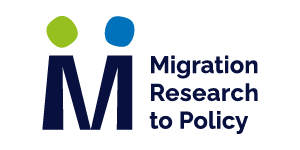Join us
We can't collaborate without you. Join our growing Co-Lab.

Which role best describes you?
Policymaker or Government Official
If you work for a governmental agency, here’s how the Co-Lab can be helpful to you:
- Learn about migration research by exploring our Research Exchange
- Share your tips on how researchers could better communicate with you
- Sign up for our Shorts Digest to receive a weekly email featuring rigorous but practical migration research in 1000 words or less.
Researcher or Academic
If your primary role is to research migration, here’s how the Co-Lab can be helpful to you:
- Learn about how your research could have a broader impact by exploring our Engagement Hub
- Share impactful and policy-relevant research findings
- Participate in our upcoming training.
Practitioner or Advocate
If your primary role is to advocate for migrants or deliver services, here is how the Co-Lab can be helpful to you:
- Learn about migration research by exploring our Research Exchange
- Share your tips on how researchers could better communicate with you.
- Learn how you could better engage with policymakers by exploring our Engagement Hub.
Innovation Pilots
The Co-Lab has seven active Innovation Pilots that tackle critical migration issues while testing different engagement approaches. Click below to learn about and join one of these pilots.
Cities’ Responses to Large-Scale Displacement
We are developing mechanisms in the cities to share knowledge, build on research outputs and collaborate with a diverse group of stakeholders addressing challenges posed by large-scale displacement and migration.
Why
Large-scale displacement caused by conflict, persecution, and environmental factors poses significant challenges for cities worldwide. Providing reception and integration structures for refugees adds to the other policy issues on the local level, and it is most profitable to tackle those issues with coordinated and integrative policy approaches, commonly known as whole-of-community approaches. However, there is currently yet to be a systematic way for cities to conduct more systemic dialogue with diverse stakeholders, including the research community. This leads to fragmented responses and missed opportunities for effective policy development and implementation.
How
In light of these challenges, through the Migration Research to Policy Co-Lab we are facilitating structured dialogue and learning at the city-level by:
- Bringing together various stakeholders in Warsaw, Antalya, and Chemnitz
- Hosting roundtable discussions covering crisis management, policy development, support systems, and integration measures.
- Identifying critical gaps in local response, gathering opinions and preferences of migrants and city residents.
Who
- Lead Consortium Partner: Centre of Migration Research, University of Warsaw
Climate Change and Migration
We address the impact of climate change and environmental degradation on the drivers of migration by fostering coordinated policy responses, facilitating dialogue between Europe and Africa, and exploring new frameworks to foster foresight and preparedness.
Why
Climate change and environmental degradation are recognised as risk multipliers, which heighten the effects of other phenomena such as conflict, energy access, livelihood loss, and food insecurity. This also impacts on the drivers of migration. However, evidence about the interplay between environmental factors and migration remains highly complex, and policy responses are often fragmented.
How
In response, through the Migration Research to Policy Co-Lab we are working to create more coordinated and coherent policy responses by:
- providing digestible evidence for policy programming and advocacy on the links between environmental change and migration;
- supporting coordinated policy response and programming;
- facilitating dialogue between policymakers and researchers in both Europe and East Africa.
Who
- Lead Consortium Partner: Migration Policy Centre
Common European Asylum System
We are gathering evidence and helping stakeholders learn from each other to support better implementation of the Common European Asylum System (CEAS). Our ultimate goal is fairer treatment for refugees in Europe.
Why
How
- Testing new methods for mutual learning and exchanges between stakeholders, including researchers, practitioners and policymakers.
- Collating and channelling existing evidence to stakeholders using new formats.
Who
- Lead Consortium Partner: ECRE
- Strategic Stakeholder: Mosaico – action for refugees
Gender, Migration and Mobility in Africa
We bring together policymakers and researchers to increase understanding of the overlooked role of gender in African migration.
Why
The EU and its member states have increasingly intensified their focus on migration and mobility in African countries. There has also been an increase in research on this subject. However, both policy initiatives and research have overlooked how gender plays a role in migration, mobility, and forced displacement in the East and the Horn of Africa, as well as West Africa.
How
In response, through the Migration Research to Policy Co-Lab, we are working to:
- bring together policymakers and researchers to jointly increase understanding and attention to the role that gender plays in migration in regions of Africa.
- hold convenings with stakeholders and conduct focus groups.
- synthesise knowledge for different groups.
Who
- Lead Consortium Partner: Migration Policy Centre
Migrant Self-Employment, Integration and Inclusion
We are helping migrants in two European cities to start and grow businesses by identifying policy gaps and creating action plans for better support, boosting the economy.
Why
When migrants can run businesses and work independently, it contributes to economic growth, creation of jobs, and social inclusion. However, practical and policy challenges can limit migrant self-employment, including navigating legal and administrative hurdles and accessing financial resources.
How
In response to this, through the Migration to Policy Co-Lab we are working with two cities to:
- conduct needs assessments and roundtables with stakeholders to identify gaps and further develop the policy framework supporting migrant self-employment.
- implement concrete pilot actions and share results and experiences with others.
Who
- Lead Consortium Partner: Migration Policy Group
Policy Dialogue in EU Migration Governance
We help experts and practitioners get involved in EU migration policy by running an annual policy event where we identify important issues and suggest ways to make discussions between governments better.
Why
The way researchers and national governments interact significantly shapes EU migration policies. However, engaging in these discussions can be challenging due to complex government processes, varying goals among countries, and the need for solid negotiation skills to represent a wide range of interests effectively.
How
To address these challenges, through the Migration Research to Policy Co-Lab we are working to
- make it easier for experts and practitioners to share their experiences and opinions on migration.
- use the International Centre for Migration Policy Development (ICMPD)’s Annual Policy Initiative as a vehicle to identify critical issues, find problems, and suggest solutions.
Who
- Lead Consortium Partner: International Centre for Migration Policy Development (ICMPD)
Protecting Children in Migration
We protect migrant children in Greece, Serbia, and Italy by sharing knowledge, addressing challenges, and bridging policy gaps between practitioners and policymakers.
Why
The ‘Balkan Route’ is one of the main migratory paths via land into Europe. Thousands of children take this route every year, with or without their families or guardians. However, there are still significant challenges to protecting children from exploitation, abuse and violence during their journey and their stay in Greece, Serbia and/or Italy.
How
In response, through the Migration Research to Policy Co-Lab we are working to improve the protection of children migrating along the Balkan Route by:
- centring discussions on the key needs of children in migration;
- working with practitioners and children with lived migration experience to understand where there are critical policy gaps;
- working with policymakers to develop policies to address those gaps.
Who
- Lead Consortium Partner: International Rescue Committee Italy
- Strategic Stakeholders:
- Centro Penc, Italy
- Greek Forum of Refugees, Greece
- Institute for Criminological and Sociological Research, Serbia
Join our community and stay updated on the collaboratory. Sign up for our mailing list.



